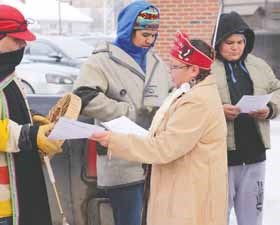In what has become an almost daily occurrence in Yorkton recently, local First Nations people marched down Broadway Street last week to protest federal government treatment of indigenous peoples.
The rallies are part of a national campaign that has been dubbed "Idle No More."
At issue is a laundry list of federal government legislation aboriginal people say violates their treaty and inherent rights, as well as, the United Nations Declaration on the Rights of Indigenous Peoples.
Idle No More began in early October with four Saskatchewan women, Sylvia McAdam, Jess Gordon, Nina Wilson and Sheelah Mclean, who decided to oppose Bill C-45, the government's omnibus budget implementation legislation.
"These colonial forms of legislation that the government expects to unilaterally impose on us has brought us together, to stand together," said Gordon.
On Dec. 10, First Nations across the country, including in Yorkton, staged the first of many demonstrations in a "National Day of Solidarity and Resurgence."
The next day, Theresa Spence, chief of the Attawapiskat (Ontario) First Nation began a hunger strike, which she vows she will not break until Prime Minister Stephen Harper agrees to meet with her and other aboriginal leaders to discuss the issues.
Of particular concern are changes to the Navigable Waters Protection Act (NWPA), now the Navigation Protection Act (NPA). Under the new legislation, proponents of major pipeline and interprovincial power line projects are no longer required to prove they would not damage or destroy
navigable waters. A total of 97 lakes and 62 rivers are exempt by a schedule of federally-protected waters attached to the Act.
Idle No More leaders say this is not just a First Nations issue, but affects all Canadians.
"Bill C 45 is not just about a budget, it is a direct attack on First Nations lands and on the bodies of water we all share from across this country," said McAdam. "The changes they are making to the environmental legislation is stunning in terms of the protections it will take away from the bodies of water-rivers and lakes, across the country. How can we not all be concerned about that?"
When the bill passed on December 14, it inspired further protests and the now-famous Facebook meme, "Yesterday there were 2.5 million protected lakes and rivers in Canada, today there are 159."
Garry Breitkreuz, Yorkton-Melville MP applauded changes to the NWPA in his weekly Op-Ed piece on October 19 saying it was outdated and a "frustrating bureaucracy."
"The issue has been a source of frustration for many years and has really come to force with recent flooding throughout our area," he wrote. "Repairs to washed-out roads and bridges have been delayed because of this bureaucratic black hole, resulting in needless lost time and money, and a waste of tax dollars. Even cottage owners wanting to build a dock on many of our lakes were required to seek federal approval."
Breitkreuz also dismissed concerns that the legislation endangers the environment.
"The Navigation Protection Act is legislation related to navigation," he wrote. "From an environmental perspective, our waters will continue to be protected through the Canadian Environmental Assessment Act 2012, the Canadian Environmental Protection Act, the Species at Risk Act, and the Fisheries Act."
Critics, though, claim changes to the Environmental Assessment Act and Fisheries Act, also included in the omnibus package, effectively guts environmental protection as well.
"It's been a continual Christmas morning for the pipeline industry," said Nathan Cullen, federal NDP house leader. "It's frustrating because they are rigging the entire process in order to just fast-track pipelines with as little public scrutiny and environmental protections as possible."
Bills under contention
C-45 Jobs and Growth Act 2012 (includes changes to Indian Act; Navigable Waters Protection Act; Environmental Assessment Act and Fisheries Act)
C-27 First Nations Financial Transparencies Act
S-2 Family Homes on Reserve and Matrimonial Interests or Right Act
S-6 First Nations Elections Act
S-8 Safe Drinking Water for First Nations Act
C-428 Indian Act Amendment and Replacement Act
S-207 An Act to amend the Interpretation Act
S-212 First Nations Self-Government Recognition Bill and the "First Nations" Private Ownership Act
First Nations leaders claim these bills are in direct violation Articles 18, 19 and 20 of the United Nations Declaration on the Rights of Indigenous Peoples.
Declaration on the Rights of Indigenous Peoples
Article 18: Indigenous peoples have the right to participate in decision-making in matters which would affect their rights, through representatives chosen by themselves in accordance with their own procedures, as well as to maintain and develop their own indigenous decision- making institutions.
Article 19: States shall consult and cooperate in good faith with the indigenous peoples concerned through their own representative institutions in order to obtain their free, prior and informed consent before adopt- ing and implementing legislative or administrative measures that may affect them.
Article 20:
1. Indigenous peoples have the right to maintain and develop their political, economic and social systems or institutions, to be secure in the enjoyment of their own means of subsistence and develop- ment, and to engage freely in all their traditional and other eco- nomic activities.
2. Indigenous peoples deprived of their means of subsistence and development are entitled to just and fair redress.



